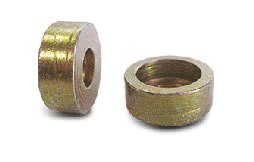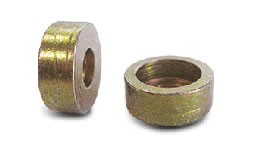
Washers come in a wide range of styles. In addition to traditional flat washers, for instance, there are cupped washers. Cupped washers are designed to compress and flatten when a bolt is tightened against them, allowing them to exert a spring-like force to protect against loosening.
There are even washers designed for specific types of fasteners, such as taper pin washers. Taper pin washers protect fastened objects from damage by distributing the fastener’s load across a greater surface area. Here’s everything you need to know about taper pin washers and how they work.
What Are Taper Pin Washers?
Taper pin washers are specialized washers designed for use with taper pins. Like all washers, they have an opening in the center. You can use a washer by inserting a fastener through the opening. As you tighten the fastener, it will press against the washer.
Taper pin washers, though, have an angled design in which one side of the opening is narrower than the other side. This unique design allows taper pins to sit evenly against an otherwise flat surface — even when the fastened parts aren’t perfectly parallel.
How Taper Pin Washers Work
As their name suggests, taper pin washers are used in conjunction with taper pins. Many mechanical systems, such as frames, rotating shafts and couplings, feature cone-shaped pins known as taper pins. But driving a taper pin directly into a mechanical system can cause one side of the pin to sit higher than the other. As a result, the pin’s load will be concentrated in a specific area, increasing the risk of damage or deformation.
Taper pin washers offer a solution. They offer a balanced seating surface for taper pins. Taper pin washers compensate for the pin’s cone shape, allowing for a tight and secure fit while properly distributing the pin’s load.
Taper Pin Washers Construction
Taper pin washers are made of strong and durable materials. You can find them in high-carbon steel, stainless steel, titanium and other alloys.
Some taper pin washers are also coated for additional protection against the elements. Zinc plating, for instance, is a common coating type. It consists of a thin outer layer of zinc that shields the underlying material from moisture. With zinc plating, taper pin washers are better protected against rust and corrosion.
Taper pin washers typically have tight tolerances. The depth of the recess, for example, may range from 0.109 inches to 0.141 inches. With tight tolerances, taper pin washers can provide a tight fit for taper pins.


